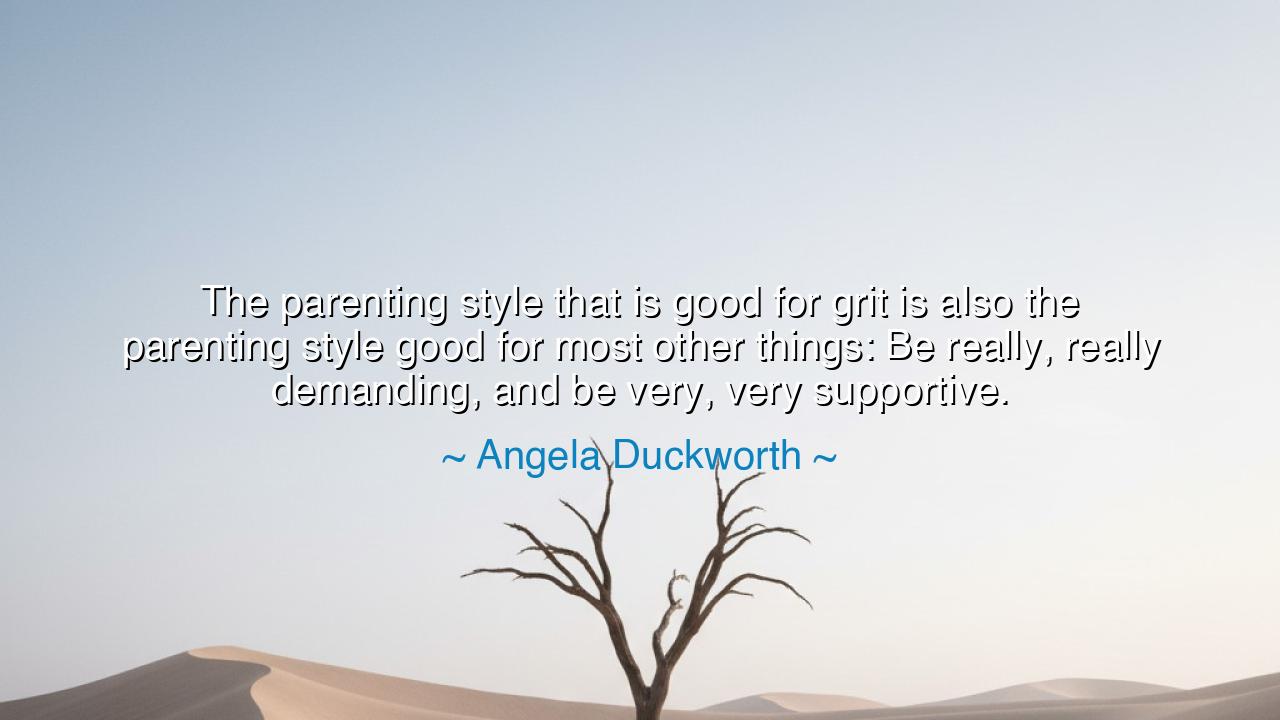
The parenting style that is good for grit is also the parenting
The parenting style that is good for grit is also the parenting style good for most other things: Be really, really demanding, and be very, very supportive.






In the words of Angela Duckworth, we are given a truth that is both fierce and tender: “The parenting style that is good for grit is also the parenting style good for most other things: Be really, really demanding, and be very, very supportive.” Here is a wisdom born not of contradiction, but of balance. For to raise children strong in heart and steadfast in spirit requires both the fire of expectation and the balm of encouragement. Without demanding, there is no striving; without supportive love, there is no endurance. Both must walk hand in hand, like twin pillars holding up the temple of a child’s soul.
The ancients knew this balance well. The Spartans, famed for their discipline, demanded much of their children, yet their harshness was softened by communal bonds and shared purpose. The Hebrews, too, spoke of parents teaching their children diligently, yet also binding those teachings with love and compassion. Duckworth’s insight is the modern echo of this eternal truth: strength is forged not in indulgence, nor in cruelty, but in the union of challenge and nurture. Grit—the power to persevere through trials—is born when the child learns both to rise against obstacles and to trust that they are not alone in the rising.
History gives us examples shining and clear. Consider the life of Thomas Edison, whose teachers once dismissed him as slow and incapable. His mother, Nancy Edison, refused to accept this verdict. She was demanding in her insistence that he work hard, learn, and stretch beyond what others thought possible, yet she was also fiercely supportive, encouraging him with unwavering faith in his potential. From that union of firmness and love, Edison grew into one of the greatest inventors of all time. His story reveals the very principle Duckworth proclaims: demanding effort while offering supportive love produces perseverance that can change the world.
Duckworth’s words also serve as a warning. To be only demanding, without compassion, breeds rebellion, despair, or fear. The child crushed under relentless expectation may achieve, but hollowly, without joy or resilience. Conversely, to be only supportive, without high standards, breeds complacency and weakness. The child may feel loved, but never tested, never sharpened against the stone of challenge. The art of parenting lies not in choosing one or the other, but in weaving them together into harmony.
The meaning of her teaching is deeply motivational: that the path to excellence, to virtue, to true grit, lies not in easy indulgence but in a sacred partnership between parent and child. The parent demands greatness not out of cruelty, but out of belief. The parent supports not out of weakness, but out of strength. To raise children in this way is to prepare them not just for tasks of survival, but for the higher labors of purpose, endurance, and contribution.
The lesson for us is clear. First, let us set high expectations for our children, believing that they are capable of more than comfort would suggest. Second, let us walk beside them as encouragers, offering reassurance and faith even as we push them higher. Third, let us apply the same wisdom to ourselves, for even as adults, we thrive when we are both challenged and supported. To live in balance between demand and love is to live the way of resilience.
O seekers of truth, remember this: the tree that stands tallest is both stretched by the wind and nourished by the rain. The child that grows strongest is both tested by discipline and lifted by love. To be demanding without love is to break the spirit; to be supportive without challenge is to weaken it. But to hold both together is to raise children who will endure, who will strive, who will give, who will prevail.
Thus, Angela Duckworth’s words endure as timeless counsel. The secret to grit, and indeed to life itself, lies not in harshness alone nor in tenderness alone, but in their union. Be demanding; be supportive. In this balance lies the making of greatness—not only in children, but in all who would rise to meet the trials of the world.






AAdministratorAdministrator
Welcome, honored guests. Please leave a comment, we will respond soon